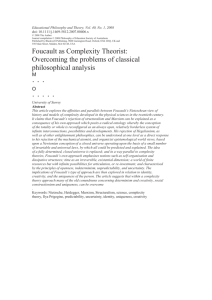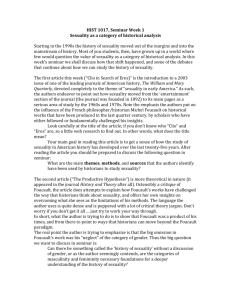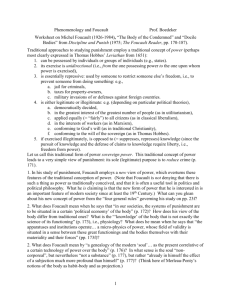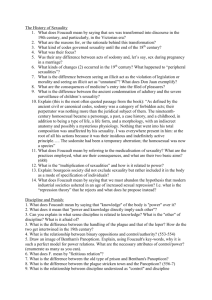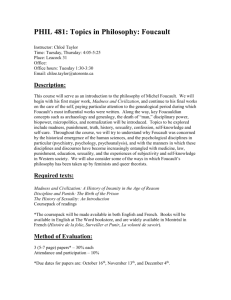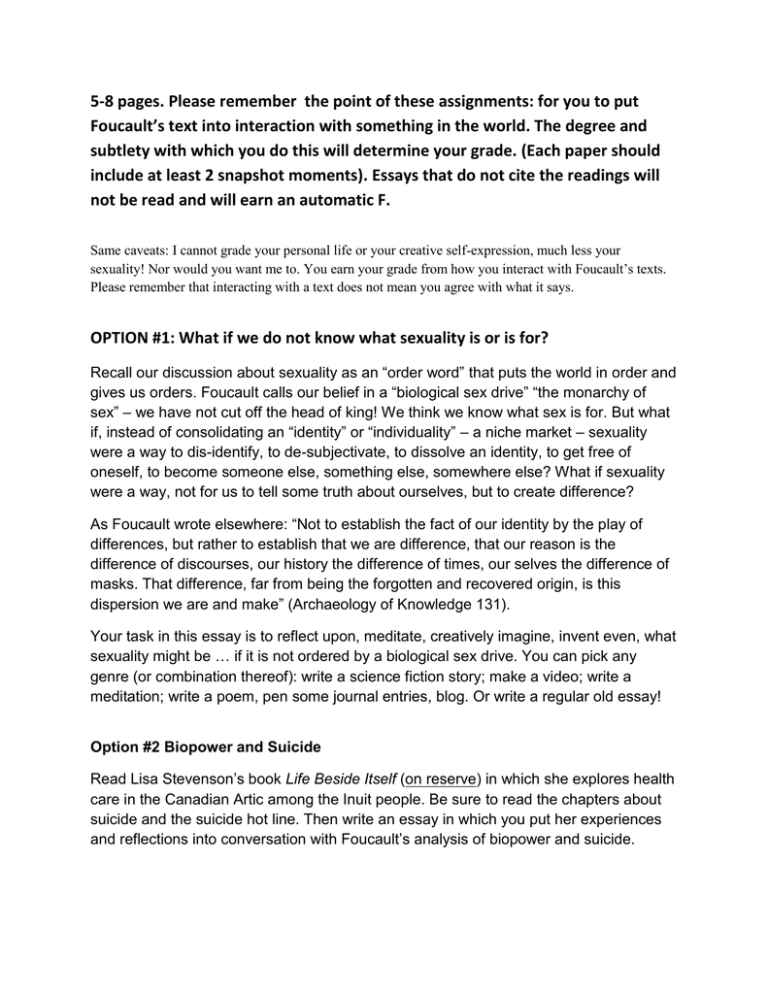
5-8 pages. Please remember the point of these assignments: for you to put
Foucault’s text into interaction with something in the world. The degree and
subtlety with which you do this will determine your grade. (Each paper should
include at least 2 snapshot moments). Essays that do not cite the readings will
not be read and will earn an automatic F.
Same caveats: I cannot grade your personal life or your creative self-expression, much less your
sexuality! Nor would you want me to. You earn your grade from how you interact with Foucault’s texts.
Please remember that interacting with a text does not mean you agree with what it says.
OPTION #1: What if we do not know what sexuality is or is for?
Recall our discussion about sexuality as an “order word” that puts the world in order and
gives us orders. Foucault calls our belief in a “biological sex drive” “the monarchy of
sex” – we have not cut off the head of king! We think we know what sex is for. But what
if, instead of consolidating an “identity” or “individuality” – a niche market – sexuality
were a way to dis-identify, to de-subjectivate, to dissolve an identity, to get free of
oneself, to become someone else, something else, somewhere else? What if sexuality
were a way, not for us to tell some truth about ourselves, but to create difference?
As Foucault wrote elsewhere: “Not to establish the fact of our identity by the play of
differences, but rather to establish that we are difference, that our reason is the
difference of discourses, our history the difference of times, our selves the difference of
masks. That difference, far from being the forgotten and recovered origin, is this
dispersion we are and make” (Archaeology of Knowledge 131).
Your task in this essay is to reflect upon, meditate, creatively imagine, invent even, what
sexuality might be … if it is not ordered by a biological sex drive. You can pick any
genre (or combination thereof): write a science fiction story; make a video; write a
meditation; write a poem, pen some journal entries, blog. Or write a regular old essay!
Option #2 Biopower and Suicide
Read Lisa Stevenson’s book Life Beside Itself (on reserve) in which she explores health
care in the Canadian Artic among the Inuit people. Be sure to read the chapters about
suicide and the suicide hot line. Then write an essay in which you put her experiences
and reflections into conversation with Foucault’s analysis of biopower and suicide.
OPTION #3: Curious about Foucault himself and/or his connection to queer
theory?
In the last decade of his life, Foucault became increasingly more open about his own
homosexuality. He gave a number of interviews in which he suggested that gay people
would do better to organize around (not sexual liberation but) friendship: alternative
modes of emotional attachment and belonging. He also spoke more somewhat openly
about his own involvement in sadomasochism (what we today term BDSM) as a way of
de-virilizing sex (so that it was not so focused on the penis and orgasm). Historian
David Halperin has synthesized much of this material in his book Saint Foucault. (I will
give you a xerox of a chapter). Write an essay in which you put Foucault’s thoughts and
experiments with sexuality into conversation with selected passages from History of
Sexuality vol 1.
Option # 4: Spirals of Power and Pleasure, Silence and Truth: A Laboratory
Foucault once said: “If power were never anything but repressive, if it never did anything but say
no, do you really think one would be brought to obey it? What makes power hold good, what
makes it accepted, is simply the fact that it does not only weigh on us as a force that says no,
but that it traverses and produces things, it induces pleasure, forms knowledge, produces
discourse. It needs to be considered as a productive network which runs through the whole
social body, much more than as a negative instance whose function is repression….” (“Truth
and Power” in Power/Knowledge, 119).
Pick a particular example in which you (or someone) is made to obey by being incited to “Just
do it!”
Analyze how power and pleasure spiral around each other, feeding each other on.
Analyze how knowledge is produced. What kinds of truth? Is there a secret? Is an
identity (or order-word) formed?
Option # 4: Read the collected volume entitled Two Spirit People: Native American
Gender Identity, Sexuality, and Spirituality, edited by Sue Ellen Jacobs, Wesley Thomas
and Sabine Lang. (I placed my copy on reserve). The book presents a different way of
assembling some of the diverse elements that dominant Western culture has sutured
together into biological sexuality. (Hofstra also has a video that you can stream entitled
Two Spirit People). Write an essay in which you draw on Foucault to help you explore a
different way of experiencing sex, power, knowledge, and gender.
Option # 5: Love science? Read Anne Fausto-Sterling’s Sex/Gender: Biology in a
Social World (which Hofstra has as an e-book). Write an essay putting her exploration
of gender behavior into conversation with selected passages from Foucault.
Option #6: Intrigued by some of the connections that we have been made between
women and depression? Read Jonathan Metzl’s Prozac on the Couch (My copy is on
reserve) and write an essay in which you analyze the power dynamics of confession for
women in medicine.
Option #7. Or, for a totally different take on feminist theory and depression, read the
new thing in feminist theory: Liz Wilson’s Gut Feminism, chapter 4 entitled “Chemical
Transference,” chapter 5 entitled “The Bastard Placebo” and chapter 6 entitled “The
Pharmacology of Depression.” (See me for a xerox). Write a critical book review in
which you tell me what you have learned.
Option # 8 Interested in Biopower? Read Susan Greenhalgh and Edwin Winckler’s
book Governing China’s Population: From Leninist to Neoliberal Biopolitics in which
they trace the adoption of the one-child policy in China. (My copy is on reserve.) Then
write an essay in which you discuss how this material links to Foucault’s ideas about
sexuality, power, and life. t
Option # 9. Watch the film “But I am a Cheerleader.” Write an essay in which you relate
the movie to key notions in Foucault. Be sure to think about the beginning of the film
(“perverse implantation” anyone?) AND consider the confession scene at the end?


